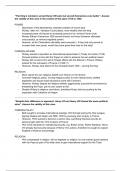“The King’s ministers served Henry VIII well, but served themselves even better”. Assess
the validity of this view in the contest of the years 1515 to 1540.
POWER
- Dissolution of the Monasteries; awarded swathes of church land
- Wolsey “alter rex”, Hampton Court palace, more wealthy than the king
- Increased power of king led to increased power for his “minions”/inner circle
- Wolsey Eltham Ordinances 1526 served himself, not Henry (however ultimately
unsuccessful, as minions regained power)
- However, all his Chancellors ultimately were executed – if they had only served to
increase their own power, would they have given their lives for the king?
FOREIGN AFFAIRS
- Wolsey earned a reputation as international peacemaker in Treaty of London (1518)
- Pursued policies in line with the Pope’s in order to advance his own political career
- Wolsey did not serve him well in foreign affairs with the failures in France; Wolsey
pushed for the reinvasion of France in 1526 (?)
- However, Wolsey took blame for the Amicable Grant 1525 – serving the King
RELIGION
- More valued his own religious beliefs over Henry’s in the divorce
- Cromwell religious policy, moving religious policy to more radical areas, drafted
legislation and issued royal injunctions (work with Cranmer)
- However, Wolsey despite his religious beliefs, aggressively pursued the annulment by
threatening the Pope, put his own career at risk
- Despite Wolsey’s religious convictions, prioritised King’s heirs by pushing for the
separation with Catherine of Aragon
“Despite their difference in approach, Henry VII and Henry VIII shared the same political
aims”. Assess the validity of this view.
FOREIGN POLICY
- Both sought to increase international prestige; HVII through joining the Holy League,
signing treaties with Spain and HRE, HVIII by pursuing wars of glory in France
- However, HVIII wanted to become a warrior king, sacrificing financial security for
personal gain with the 1512 invasion of France
- HVII more interested in maintaining security; e.g. Breton Crisis, Perkin Warbeck; Henry
VIII already had security because of Henry VII’s actions, therefore he sought to expand
England’s influence and prestige
RELIGION
- HVII uninterested in religion, did not legislate on religion; he only wanted good relations
with the Pope as part of his wider aims to gain international support for the Tudor
, dynasty, for instance by refusing to back his allies, the HRE, against the Pope in the
Italian Wars
- HVIII initially shared these aims, being crowned defender of the faith in 1521; however,
he prioritised his desire for divorce over England’s stability, eventually excommunicated
in 1534
- “Era of the parish church” under HVII no desire to upset religious stability as it
contributed to national stability
- HVIII clearly interested in doctrinal affairs with the Submission of the Clergy and
Supplication of the Ordinaries
- Actively caused rebellion with his religious reform, PoG 1536
FINANCE
- Long-term ideas for consolidation under HVII (tonnage and poundage, crown revenue,
surveys of taxation), increasing annual income from £12,000 to £48,000 in ordinary
revenue
- HVIII spent all funds left to him in first 12 years of his reign on wars
- HVII cared about keeping Parliament and country happy, raised little extraordinary
revenue, only in times of extreme crisis e.g. Breton 1489 or Perkin Warbeck 1496
- HVIII provoked rebellion in 1525 with Amicable Grant, showed less care about upsetting
the public through financial demands
- HVII saw finance as a means to consolidate his power and guarantee peace, HVIII saw
it as his personal funds for glory
“The foreign policy of Henry VIII failed to meet its objectives in the years 1509 - 1547”.
Assess the validity of this view.
INTERNATIONAL PRESTIGE
- Treaty of London (1518) was a “glittering success” according to historian Susan Doran
- Field of Cloth of Gold (1520) was a grand display of riches to impress the new French
king, Francis I
- Secured several high profile alliances in Europe, e.g. joining Holy League to ally himself
with Pope Julius II in the Treaty of Westminster 1511, Treaty of Bruges with Charles V in
1521 which allies him with a great European power, secures marriage of Mary Tudor to
Charles V
- However, these prestigious alliance fell apart after the Battle of Pavia in 1525
- His repeated attempts to increase England’s relevancy in Europe through treaties and
leagues like the League of Cognac in 1526 ultimately fell apart, marriage alliance fell
through after Charles V and Francis I sign Peace of Cambrai in 1529
- Failed to make England a power in its own right, too dependent on Habsburg-Valois
Conflict
- Ultimately, England left isolated and Spanish alliance broken after the annulment
- Tried to regain prestige in 1540s with the Battle of Solway Moss and the Siege of
Boulogne, however he merely wasted more money and left Edward with less




